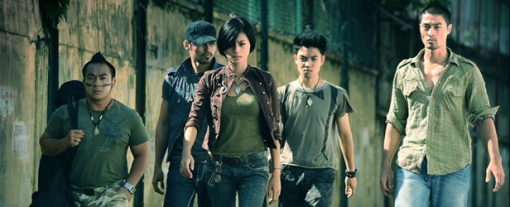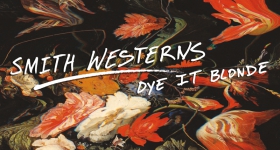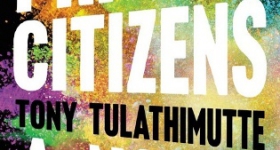Chuck Mitsui's One Kine Day
Continuing Hyphen's coverage of SFIAAFF 29, our dedicated staffers take a peek at a Vietnamese action flick; a coming of age story set in the Hawaiian skateboarding scene; and the story of a multi-ethnic woman from the Mideast struggling to reconcile her hipster lifestyle in Manhattan with her post-9/11 political awakening.
One Kine Day
Dir: Chuck Mitsui
In an early scene of One Kine Day, the main character Ralsto sits on a gorgeous beach in his hometown of Oahu, drinking and chatting idly with a friend. He really shouldn’t be there -- he’s just been fired from his job at the skate shop and desperately needs money so that his pregnant girlfriend can “get da kine.” As he gets up to leave, Ralsto grabs at the green baseball tee wrapped goofily over his shoulder-length brown locks, and throws the shirt back on, inside out. This is how it remains for the rest of the movie.
It’s an odd yet striking detail that sums up the breezy attitude of the carefree, but also exemplifies the careful attention that director Chuck Mitsui, in his directorial debut, pays to convey the natural authenticity in this portrayal of local Hawaiian culture. As One Kine Day takes you on the local’s tour of Oahu, it delves into a panorama of contemporary social issues, ones that go unnoticed in all those idyllic “Wish You Were Here” postcards. It’s a homegrown and highly enjoyable film, without a surfboard or coconut bra in sight.
Ralsto (Ryan Greer) is a sweet-faced skater boy used to living up the slacker lifestyle. Flanking his more outspoken, colorful friends and blindly following their half-baked ideas to raise funds for his girlfriend’s abortion, Ralsto falls into situations that walk a nervous line between tragedy and groan-worthy folly: a cockfight with high stakes, breaking into a drug dealer’s house, and futile attempts to salvage stolen weed that’s gone for a spin in the washing machine. Meanwhile, his girlfriend Alea (Christa B. Allen) ponders keeping the baby, convinced by her teen mom friend that “having a baby is not the end of the world,” nor does it have to get in the way of your social life.
Bursting with chill Jawaiian soundtracks and ‘808’ pride, One Kine Day is both a tribute and a lesson, with inside jokes and caricatures of island archetypes sure to please the locals, while mainlanders are given a taste of what “da kine” is all about. Colloquial slang and verbal inflections pepper the script, at times inscrutably. Every shot, from the friendly faces to the back of Ralsto’s bedroom door, feel like shout-outs to local flavors and cultural norms well woven into the fabric of life. Even the actors at times feel like they’re just playing exaggerations of themselves.
Gorgeous scenic shots juxtapose sharply against the complex issues portrayed such as teen pregnancy and drug usage, and the unfortunate combination of the two. The story does not overly-dramatize events nor feel the need to make all the ends tie up neatly in the one day, making it seem all the more believable. One Kine Day deals with serious issues through honest expressions and realistic conversations. There are consequences, gauged appropriately, but thankfully no sappy prosaic monologue, no grand moment of redemption, just some late night skateboarding, a ride home, and the morning after.
--Nicole Wong

Clash
Dir: Le Thanh Son
In the first few minutes of Clash, two of the lead characters get into a heated argument in their hideout. After a stare down and a drop kick, the magnificent Ngo Than Van shows everyone who’s boss. After the brief altercation, one gang member blurts out, “Just like a Hong Kong gangster movie!” an obvious tongue-in-cheek salute to the one of the film’s major influences.
The movie is already Vietnam’s highest grossing film to date and is a throwback to the action movies coming out of Hong Kong in the late 1980s to early 1990s, where choreographed action scenes take precedence over any sort of plot development. And there are fight scenes aplenty as the movie progresses towards the final showdown.
Ngo Than Van plays Trinh, a mercenary codenamed Phoenix who puts a team together to recover a laptop that has secret codes for Vietnam’s first satellite. The filmmakers don't explain what evil may befall the country if the computer falls into the wrong hands, specifically some beaucoup evil dudes from France and China. But keeping true to its Hong Kong predecessors, worries about plot inconsistencies go out the window as Trinh and her buddies lay waste to seemingly dozens of thugs over the 100-minute movie as they search for the laptop.
There are subplots concerning the movie’s other lead played by Johnny Tri Nguyen, the Asian American actor who stood in as the main stunt-double for Tobey Maguire in the Spider Man movies. Even though he shines as an acrobatic martial artist, his acting chops aren’t as impressive. He has a monochrome presence and a stilted dialogue style.
But don’t mistake this review as negative one. If anything, Clash succeeds as a chop socky bundle of fun. It hits all the right notes for fans of Hong Kong action movies. I found myself giddy as the leads pulled off some ridiculous kicks and punches. At some points I was transported back to my teen years when I used to hoot and holler at early Chow Yun Fat or Jet Li movies.
In the end, the film owes a great deal to Ngo Than Van as the glue that held the film together. I was mesmerized every time she was on screen because she played it straight and avoided hamming it up like some of her costars. Despite the film’s absurdist moments and confounding plotlines, Ngo’s brilliance and beauty shines through. Watching her punch, kick, and sashay you can’t help but root for her even as the world conspires against her.
But don’t take my word for it. Take a chance on Ngo Thanh Van and see the future of Vietnamese cinema.
--Ahmad Coo

The Imperialists Are Still Alive!
Dir: Zeina Durra
The Imperialists Are Still Alive!
Dir: Zeina Durra
Set in post-9/11 Manhattan, Jordanian/Lebanese/Bosnian/Palestinian Asya (Elodie Bouchez) is a successful conceptual artist who hobnobs with the posh fashion and art elite, hopping continually between gallery openings and scenester bars. Multilingual and raised in Paris, Asya navigates readily through the multicultural spaces of New York City.
When her childhood friend Faisal disappears (rumored to have been abducted by the CIA), Asya’s anxiety about post 9/11 surveillance are exacerbated. Israel has also begun bombing Beirut -- where her brother lives -- and Asya’s concern over his safety threatens to derail her. Javier (Jose Maria de Tavira), a PhD student from Mexico City and Asya’s love interest, sympathizes with the suspicion and scorn her community faces. However, he fails to fully understand, believing Asya is overly paranoid and "sees conspiracies in everything."
With the film’s designer shoes and dogs, hipsters with unkempt beards, and references to Oscar de la Renta, the viewer might feel conflicted or unsympathetic with the inconsistency between the glamorous, and even pretentious lifestyle of Asya and Javier -- and the distress of war (which is never shown) and racial profiling. Although Asya has a personal connection to the conflict overseas, she is to a great extent shielded by her status and class. However, this geographical and economic distance also renders her powerless to take action. In a moment of frustration she vows to join “the fighters” in Lebanon, yet it’s obvious she doesn’t know where to begin.
For the most part, Asya carries on with her life … which is the way most people deal with uncertainty. She goes to a party but ducks into a bedroom to briefly check the news. Later, on the way to the club, she listens to the radio with a group of somber men in the back of a bodega. Although the fauxmopolitans in her social group may seem phony, the way in which Asya copes with the unknown on a day-to-day basis appears sincere and believable.
Although The Imperialists Are Still Alive is especially timely and relevant to the recent unrest in Egypt and the Middle East, the film doesn't take an overt stance in regards to religion or politics. Asya understands stereotypes around terrorism and even creates political art (the film opens with her posing nude for a photo shoot, face covered by a kufiyyah), but later panics that her art will lead the CIA to brand her a militant. Asya may perform this balancing act for her own protection, and perhaps, acceptance within her social circle. Writer and director Zeina Durra refrains from imposing concrete or clear takeaways, instead providing an intimate glimpse into how an overseas conflict plays out in a very personal, quiet turmoil.










Comments